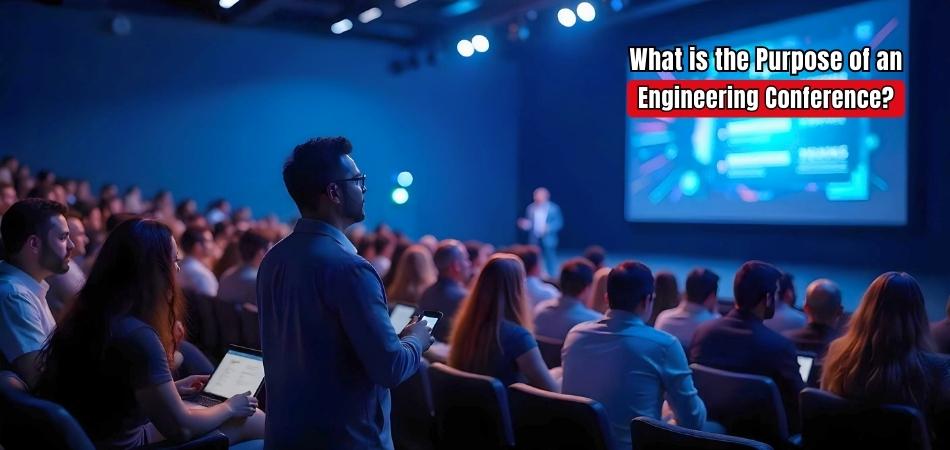Engineers from across various disciplines benefit greatly from engineering conferences. These events bring together experts, practitioners, and students to share knowledge, discuss challenges, and explore innovations in the field. There might be a question on your mind: What is the purpose of an engineering conference?
The purpose of an engineering conference is to support collaboration, facilitate knowledge sharing, and improve professional development. Attendees gain insights into current trends, advancements in technology, and best practices in engineering.
Are you curious about what these events entail? In this article, you’ll learn about the benefits of attending engineering conferences and how to make the most of them. Let’s explore everything you need to know.
What Exactly Happens At Engineering Conferences?
Engineering conferences are dynamic places where professionals, researchers, and students converge to share advancements, discuss challenges, and explore the latest innovations in the field. These events provide a platform for presenting research papers, showcasing prototypes, and engaging in stimulating discussions that shape engineering’s future.
Attendees gain insights into emerging technologies and industry trends while networking with experts from diverse disciplines. Workshops and panel discussions are key highlights of such conferences, offering hands-on learning experiences and expert perspectives. Industry leaders often deliver keynote speeches, inspiring attendees with real-world applications and success stories.
The interactive sessions encourage collaboration and encourage knowledge sharing, benefiting both individuals and organizations. For those planning to attend upcoming engineering conferences, these events are perfect for expanding professional networks and staying updated. Engineering conferences serve as a gateway to innovation, connecting ideas and people who drive the engineering world forward.
What Is the Purpose of an Engineering Conference?
The purpose of an engineering conference is multi-faceted, focusing on professional development, knowledge sharing, and networking. Here are the key purposes of an engineering conference.

Knowledge Sharing
Conferences provide a platform for experts to share their research findings and insights. Presentations and workshops cover a wide array of topics relevant to the field of engineering, including new technologies, methodologies, and case studies. This sharing of knowledge elevates the collective awareness of industry trends and best practices.
Networking Opportunities
Engineering conferences bring together professionals from various sectors, including academia, industry, and government. This diversity offers networking opportunities, allowing attendees to connect with like-minded individuals and potential collaborators. Building these professional relationships can lead to partnerships and new opportunities in the future.
Professional Development
Attending conferences is a valuable way to further your professional growth. Workshops and keynote sessions provide insights into the latest skills and knowledge required in the engineering field. Engaging with industry leaders allows participants to learn about career advancements and explore potential pathways for their careers.
Discussion of Industry Challenges
Conferences often focus on current challenges facing the engineering community. Attendees can engage in discussions about these issues and explore innovative solutions. This collaborative problem-solving approach can lead to actionable insights and strategies that participants can implement in their work.
Exposure to Latest Technologies
Many conferences feature exhibitors showcasing the latest technologies and tools in engineering. This exposure allows participants to see firsthand how these innovations can be applied to their work. Engaging with vendors and exploring new products can help engineers stay competitive and informed about advancements in their field.
Inspiration and Motivation
Attending an engineering conference can be an inspiring experience. Hearing success stories and innovative ideas from peers can motivate attendees to think creatively and embrace new approaches. The excitement of being surrounded by passionate professionals can reignite enthusiasm for one’s work.
Recognition of Achievements
Many engineering conferences recognize outstanding contributions through awards and presentations. This recognition can increase the visibility of the work being done in the field and motivate others to pursue excellence in their projects.
Key Benefits of Participating in Engineering Conferences
Engineering conferences offer a wealth of opportunities beyond traditional knowledge sharing and networking. From networking to skill enhancement, these advantages can significantly impact your career development. Below are some key benefits of attending an engineering conference:
- Recognition and Credibility: Many engineering conferences highlight outstanding contributions through awards and acknowledgments. Gaining recognition in such a forum enhances your professional credibility and boosts visibility within the industry.
- Inspiration and Innovation: Listening to pioneers in the field can lead to new ideas and encourage innovative thinking. The motivational atmosphere of a conference often leads attendees to revisit their projects with renewed enthusiasm.
- Global Perspectives: Conferences attract attendees from diverse cultural and professional backgrounds, offering a diverse global outlook on industry practices. These perspectives provide fresh approaches to tackling challenges and broaden understanding of engineering’s impact worldwide.
- Hands-On Learning Experiences: Live demonstrations and hands-on workshops enable participants to engage directly with emerging technologies and techniques. This practical exposure helps attendees better conceptualize applications and gives attendees confidence in implementing new solutions.
- Career Advancement Opportunities: Engineering conferences often provide direct access to industry leaders and potential mentors. Engaging with these professionals can open doors to exciting career paths, partnerships, and advanced learning opportunities.
Process for Participating in an Engineering Conference
Engaging in an engineering conference requires thoughtful preparation and planning. This section will guide you through the essential steps to ensure a successful and rewarding experience.
Research Upcoming Conferences
Start by identifying relevant engineering conferences in your field. Use online resources, industry publications, and professional associations to find events that align with your interests. Make a list of conferences that seem promising and check their schedules.
Define Your Objectives
Before registering, clarify your goals for attending the conference. Are you looking to network, present your research, or learn about new technologies? Knowing your objectives will help you choose the right conference and plan your participation accordingly.
Register Early
Once you’ve selected a conference, the next step is applying for engineering conference as early as possible. Early registration often provides discounts and ensures you secure your spot. Keep an eye on registration deadlines to avoid missing out on valuable opportunities.
Plan Your Travel and Accommodation
Arrange your travel and accommodation well in advance. Look for hotels near the conference venue to reduce commute time. Consider transportation options for getting to and from the event to ensure a smooth experience.
Prepare Your Materials
If you plan to present at the conference, prepare your presentation materials ahead of time. Create engaging slides and practice your delivery multiple times. Bring enough business cards to share with new contacts and potential collaborators.
Familiarize Yourself with the Agenda
Review the conference agenda to identify sessions and workshops you want to attend. Highlight keynotes, panel discussions, and networking events that align with your interests. This will help you maximize your time at the conference.
By following these steps, you can effectively participate in an engineering conference and maximize the value of your experience.
Tips for Networking Effectively at Engineering Conferences
Networking at engineering conferences is crucial for building professional relationships. Here are some practical tips to help you make the most of your networking opportunities.
- Be Approachable: Smile and maintain open body language to appear friendly and approachable. This invites others to engage with you. Avoid crossing your arms or looking at your phone, as these behaviors can signal disinterest.
- Prepare Your Introduction: Have a brief introduction ready that includes your name, role, and interests. Practice this introduction so that you can share it confidently with others. A well-prepared introduction can make a positive first impression.
- Attend Networking Events: Participate in organized networking events or social gatherings during the conference. These events are designed to facilitate interactions, making it easier to meet new people. Be proactive in introducing yourself and initiating conversations.
- Ask Open-Ended Questions: Engage in conversations by asking open-ended questions that encourage discussion. Questions like “What brought you to this conference?” or “What trends are you seeing in your work?” can lead to meaningful exchanges.
- Exchange Business Cards: Bring plenty of business cards to share with new contacts. After meaningful conversations, offer your card and ask for theirs in return. This helps establish a connection that you can follow up on after the conference.
- Utilize Social Media: Use social media platforms to connect with attendees before, during, and after the conference. Engaging with others online can enhance your visibility and facilitate connections. Consider using a specific conference hashtag to join the conversation.
Engineering Conferences: What Should You Have in Mind?
Engineering conferences provide valuable opportunities to connect with industry leaders, share innovative ideas, and stay updated on emerging trends. As you prepare, you have to understand what you can expect from an engineering conference. Below are the typical activities you can look forward to at these events, helping you prepare for a rewarding experience.
Keynote Presentations
Most conferences feature keynote presentations by prominent figures in the field. These talks often provide valuable insights into current trends and future directions. Attending these sessions can inspire new ideas and approaches in your work.
Workshops and Breakout Sessions
Conferences usually include various workshops and breakout sessions. These smaller, interactive settings allow for deeper discussions and hands-on learning. Participants can engage with experts and ask questions related to their specific interests.
Networking Opportunities
Expect ample opportunities to network with fellow attendees. Many conferences have designated networking sessions or social events. Use these moments to connect with other professionals, share experiences, and discuss potential collaborations.
Exhibitor Showcase
Some conferences feature an exhibitor showcase, where organizations display their products and services. This can be an excellent chance to learn about new tools and technologies in your field. Engaging with vendors can also lead to potential partnerships.
Cultural Experiences
If the conference offers city tours or cultural experiences, take advantage of them. These activities can provide a break from the conference schedule while allowing you to explore the local area. It’s a great way to experience the culture and make lasting memories.
Awards and Recognition
Many conferences recognize outstanding papers and presentations. If you’re participating, be aware of any award ceremonies. These recognitions can improve your visibility and credibility in the field.
Frequently Asked Questions (FAQs)
We’ve addressed common questions related to the purpose of engineering conferences. These FAQs will help clarify any doubts you may have and provide further insights into what to expect from these valuable events.
How Can I Find Upcoming Engineering Conferences?
To find upcoming engineering conferences, check professional association websites and industry publications. Online platforms specializing in conference listings can also provide comprehensive information. Following relevant organizations on social media can help you stay updated.
Can I Present My Research at an Engineering Conference?
Yes, many engineering conferences welcome research presentations from attendees. Check the conference website for submission guidelines and deadlines. Presenting your research can increase your visibility and contribute to discussions in your field.
What Should I Wear to an Engineering Conference?
Opt for business casual attire when attending an engineering conference. Comfortable clothing is important, as you may spend long hours attending sessions and networking. Always check the specific conference guidelines for any recommended dress codes.
How Can I Make the Most of My Conference Experience?
To maximize your conference experience, plan and define your goals. Engage actively in sessions, participate in discussions, and network with other attendees. Following up after the conference can also help you maintain valuable connections.
Final Words
Engineering conferences serve as vital platforms for knowledge sharing, networking, and professional growth. Attending these events allows engineers to stay updated on industry trends, exchange innovative ideas, and connect with peers who share their passion for the field.
So, what is the purpose of an engineering conference? The primary aim is to facilitate collaboration among engineers, industry experts, and researchers while enhancing professional development. These conferences provide opportunities to learn from thought leaders, engage in discussions on emerging trends, and explore practical solutions to industry challenges.







